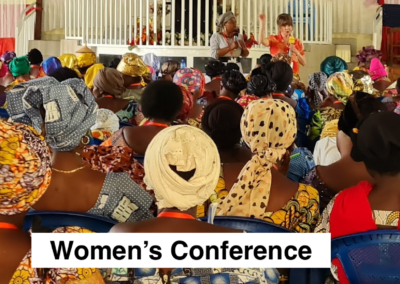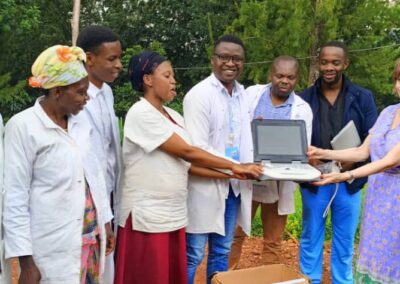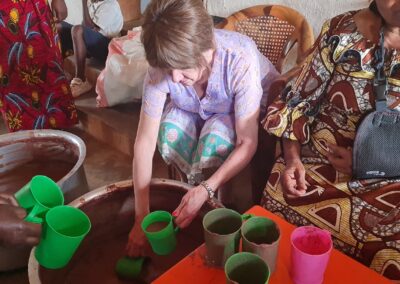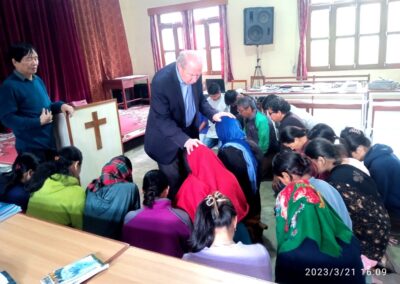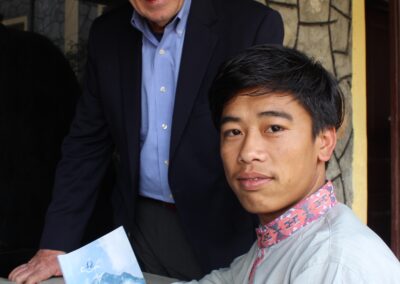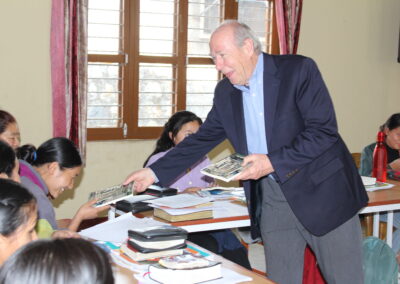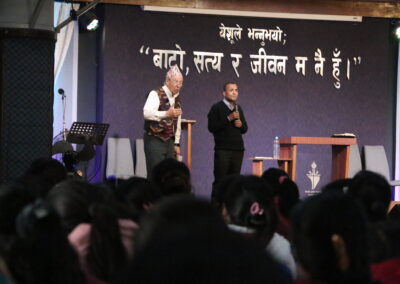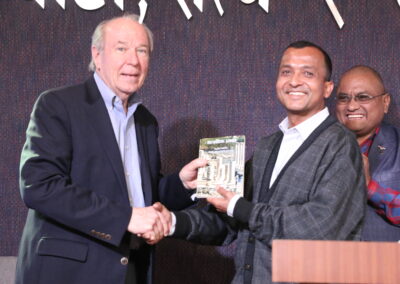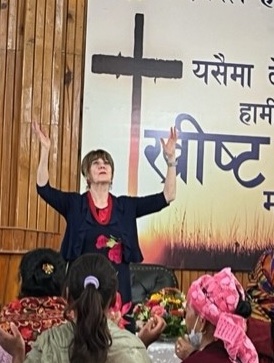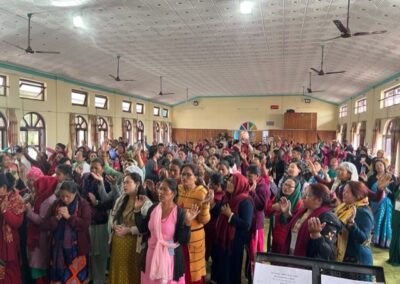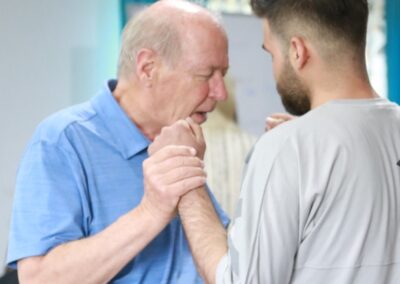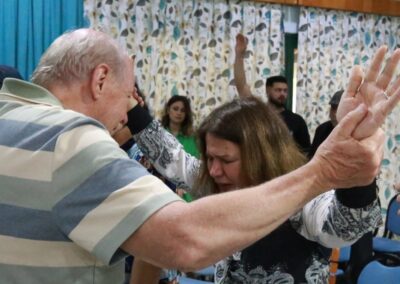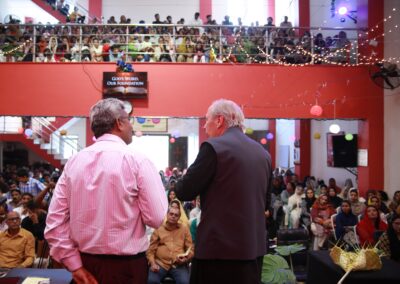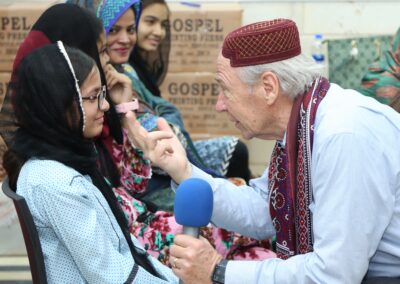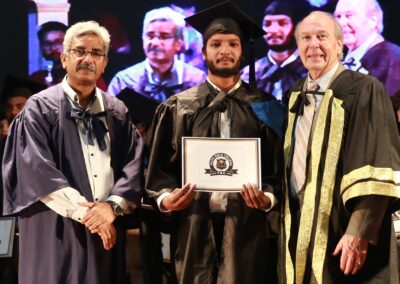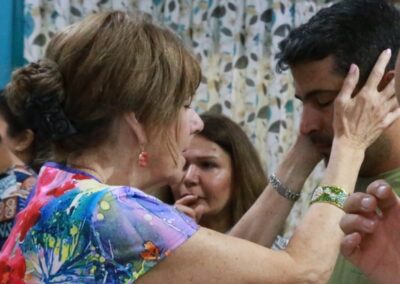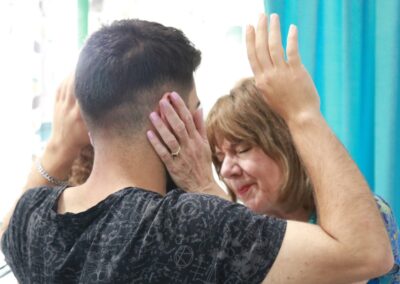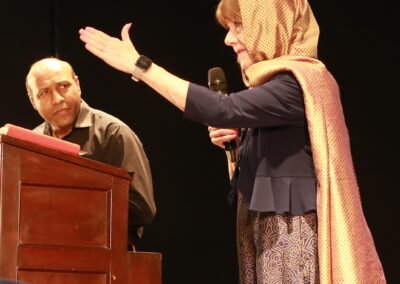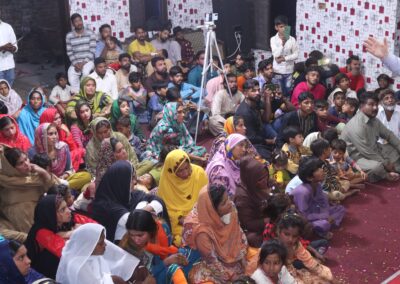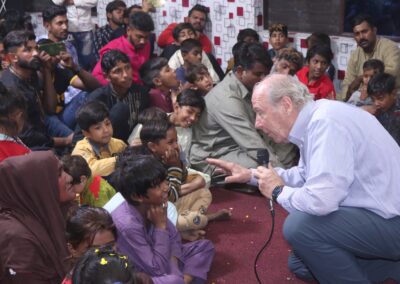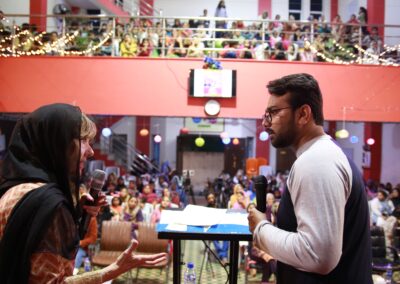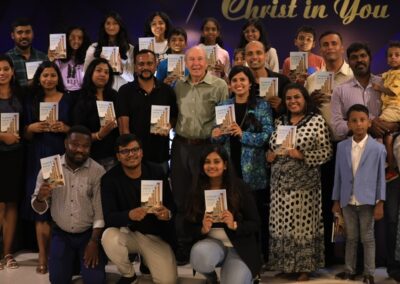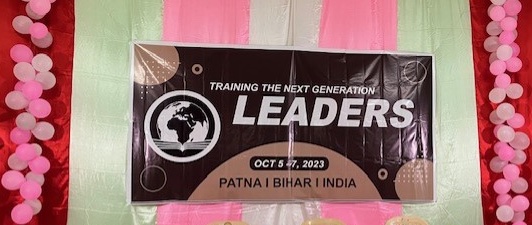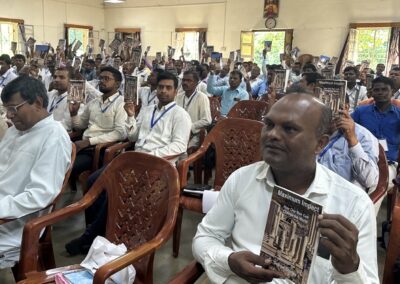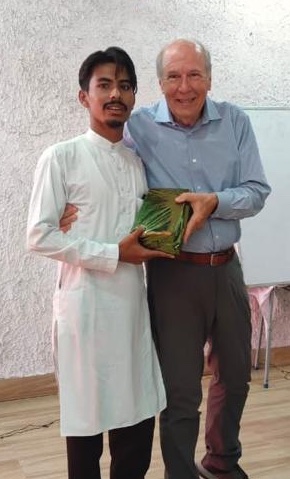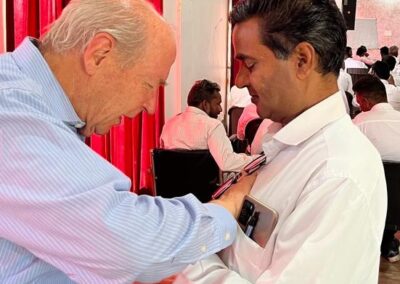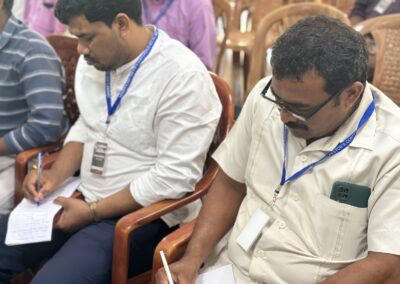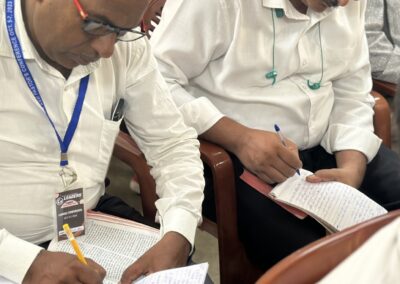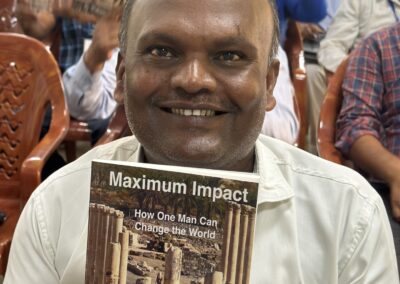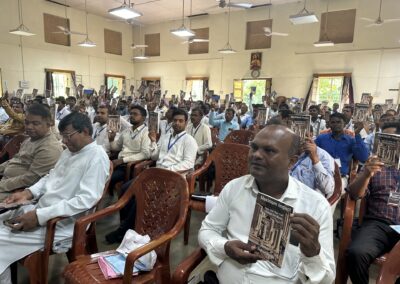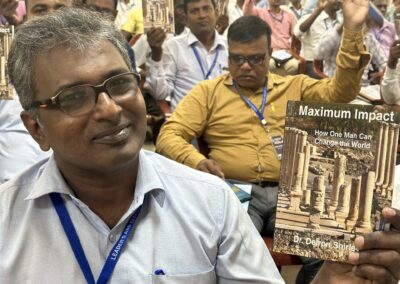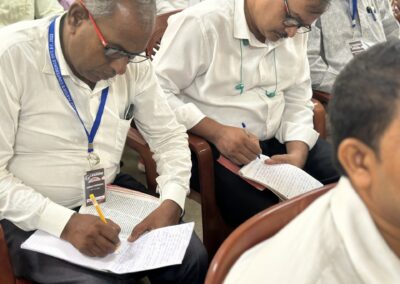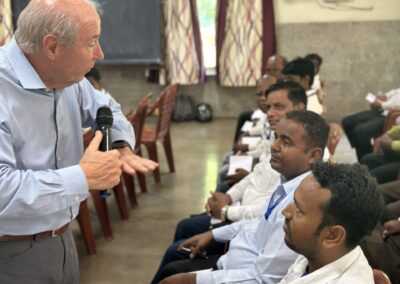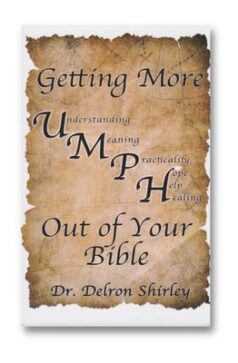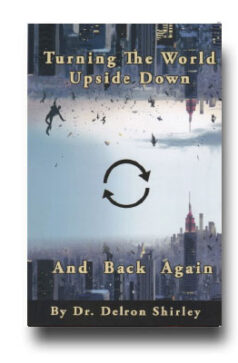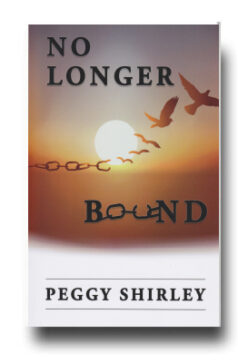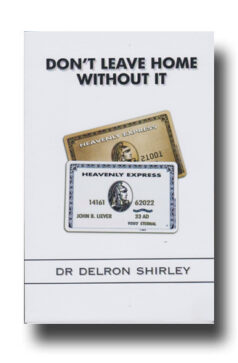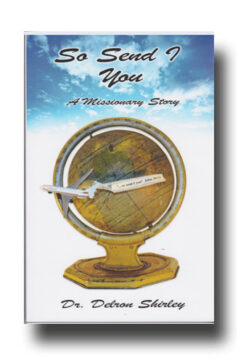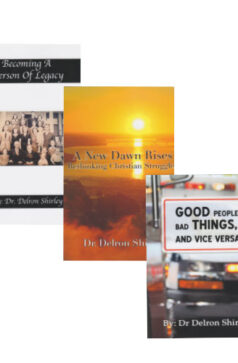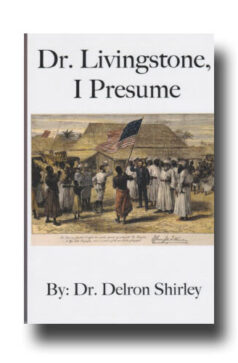Democratic Republic of the Congo by Peggy Shirley
I have a really exciting testimony to share from my recent mission to the Democratic Republic of the Congo, but I need to give you a bit of the background before I can tell you what happened. On Delron’s last trip to the Congo, he visited a friend of his who, after completing medical school, had taken the challenge of running an underfunded and ill-equipped hospital in a remote area of the country. As he was touring the grounds, Delron noticed a group of pregnant women camping on the lawn. The doctor explained that the women have no way of knowing exactly how far along they are in their pregnancies; so, they come early and wait to avoid having to travel over the rough terrain while in labor. With that explanation, Teach All Nations made the decision to buy the hospital a portable ultrasound machine that the doctor could take to the villages and check the women so he could tell them when they needed to come to him for their deliveries. This is where my story begins; I delivered the machine on this trip and asked if I could witness its first use. Well, it turned out that the doctor picked just the right lady for the demonstration. I watched the ultrasound as I held the baby’s mother head up so she could see the baby’s image on the screen. We could tell there was little movement, and the doctor realized that there were complications that required an emergency C-section. After the operation, he told me that the baby would have died if they had not examined the mother with the new ultrasound machine. Thanks to the friends and supporters of Teach All Nations, a life was saved – and on the very first time the machine was used!! This experience will forever be in my memory.
Although being part of saving a life could be considered a highlight of the trip, my four-hour-each-way trip of the roughest road you can imagine to the hospital was actually nothing more than a footnote to the half-way-around-the world journey to Africa. The real testimony from this trip was not the delivery of a machine that can see beneath the surface of a pregnant woman’s belly but the Word of God that penetrates into the very hearts of men.
I was invited to speak at several churches and do a women’s conference at one of the largest churches in Bukavu, Congo. I had my book, Women for the Harvest, translated into the local language. This is the twelfth language my book has been translated into. Very few women are allowed to speak in front of men according to the Congolese culture. I was able to talk to the pastor about what the scriptures really say about women speaking in the church and showed him where seven women were commended as co-laborers with Paul in Romans chapter sixteen. He said that the Lord had been dealing with him about this, and I encouraged him to read my book to understand the correct context of the scriptures that people use to say Paul said women can’t preach or teach. After I taught that Sunday, I think the Lord showed him that God anoints women as well as men to teach.
The next day was the beginning of a three-day women’s conference sponsored by Teach All Nations. My “spiritual daughter” Julie and I spoke all day encouraging the women to believe in themselves and that they were chosen – as John chapter fifteen says “to go bear fruit” – as well as the men. The first two days were for leaders only with an attendance limited to three hundred and fifty to whom we presented a free copy of the book and taught them on the women in the Old and New Testaments who represented all the fivefold ministry. They had never heard this before. I also went into a clear teaching of what Paul was really saying in I Corinthians 14:34 and I Timothy 2:12 about women not speaking in the services. They were so encouraged and excited to learn that the Lord uses women in all positions in the church. I was also able to present audio Bibles with the scripture in their native language to several of the women who minister in remote areas where most of the local women are illiterate. They will be able to go back to their homes and begin Bible study groups by playing the oral version of the Word of God.
The third day was open to all the women in the area churches, and we had over fifteen hundred participants. I heard that some of the women had traveled by foot for three days to attend the meeting and then had to make the same arduous trip home again. I spoke on freedom from the past. They have never been taught that the Lord can and wants to heal us from emotional wounds and traumatic pasts.
I believe that the women were stirred up to get busy for the Lord as well as the men. They and their pastors came to understand how valuable the women are to the Body of Christ. The truths that I taught on emotional healing where new to them as I explained that we are three-part personalities – body, soul, and spirit – and need to be whole in each dimension. I believe there was fruit left there that will remain for His glory.
In the same way that the ultrasound machine enabled the doctor to save the life of the baby at that village hospital, the Word of God that I shared with the women at the conference, with the congregations in the churches where I ministered, and with the pastors whom I spoke with privately will produce new life in the churches in Africa as the people are healed of their emotional scars and as the women are now encouraged to give spiritual birth. I don’t know if I’ll ever have the opportunity to see that village baby as it grows up, but I know that I’ll see the growth in the churches when I return to Africa on future missions.
I thank all the people that made my trip possible as we had to pay all the expenses of the conference and publishing the books as well as all the travel expenses. God used you as part of His “His team” to preach His Word with great results which will definitely have an eternal impact on the area as a new army of women take their places in the harvest!
Nepal by Delron Shirley
Although Nepal has been a major focus of the ministry of Teach All Nations since its inception, we haven’t had the opportunity to be back in the country for several years. So, this trip was especially meaningful in that we were able to renew old friendships and see how the Lord has blessed and increased the ministry there over the past few years – even in spite of the pandemic. In fact, the pandemic was not only the reason that we were unable to visit Nepal for the last three years but also the motivation for this trip. The believers in the country were begging for us to come, saying that they were hungry for a time to get together for fellowship, encouragement, teaching, and empowering.
We concentrated our ministry in the two major cities of the country – Kathmandu and Pokhara. Peggy and Linda Easton (one of our board members and one of Peggy’s faithful ministry partners) hosted women’s conferences while Delron taught at the Bible college and led church conferences. In addition, we ministered in several churches and also released the Nepali version of Delron’s recent book Maximum Impact. Attendance at each of the conferences was between three and four hundred delegates, but the impact will be increased exponentially as each delegate will essentially become an ambassador, taking the message far and wide throughout the nation. In each meeting, we emphasized the necessity of being filled with the Holy Spirit and operating under the power of His anointing. One highlight was the time that Delron had all the people who had never laid hands on the sick and prayed for their healing to minister to those who had physical needs. As a result, more than a dozen individuals testified to having received a healing that could be immediately confirmed. We also equipped some ministers who work among illiterate tribes with solar-powered audio Bibles so they can provide the Word of God to those who cannot read it for themselves.
There were several sad moments for us during our visit as we spent time with the families of some prominent church leaders who had passed away since our last time in the country, leaving some serious voids in the top leadership in the Body of Christ. Yet, these losses only “added fuel to the fire” that has always been the driving force behind the ministry of Teach All Nations – to raise up a new generation of discipled leaders!
Please take the time to prayerfully read the enclosed pamphlet to understand the full story and ask the Lord how He desires for you to become part of the vision.
Jesus told His disciples that He wanted to produce fruit in their lives and then added that He wanted that fruit to have lasting results (John 15:16) – not just a flash-in-the-pan reaction. I recently had the opportunity to see firsthand what He was talking about when He had that conversation with His followers; however, I have to share the backstory of how the seed got planted in the first place.
It all began in a previous millennium. Wow! That sounds like ancient history – and it was in one way of looking at it. Actually, it was the mid-1990s – about three decades ago. I was in the Himalayan nation Nepal on my annual missionary trip to teach the leaders in the emerging Christian movement that had begun to explode when the king granted religious freedom in the Hindu nation which at previously not tolerated any gospel ministry and had severely persecuted anyone who would dare to “take up the cross and follow Jesus” with even the simplest expression of faith as having a Bible in his home.
When the people of the country began to insist that they wanted to join the modern world with a democratic government, the monarch accommodated them by granting a new constitution which included the provision of freedom of religion. Acting upon that new freedom, I immediately responded by organizing trips into the country to share the gospel and equip the ones who responded to the message to take roles of leadership in the Christian movement that was being birthed.
The first thing I needed was literature in the Nepali language – no small hurdle since no one was working in the country because all ministry there had been strictly forbidden; so, no one was publishing in the language since there was no way to use the materials. I contacted organization after organization asking for literature and was met with one dead end after another. To my surprise, I discovered that World Missionary Press, a gospel publishing company that was essentially in my own backyard – about thirty miles away – and with whom I had a very close friendship, was producing Nepali-language scripture portions “by the ton.”
Armed with several cases of their literature, a group of six of us set out for Kathmandu. At the customs counter in the airport, I was questioned about the cases we were transporting into the country. I explained that they were filled with literature that we intended to distribute free-of-charge to the people of the country. I then ripped open one of the boxes and started handing samples to all the customs officers. I’ve always wondered if these might have been the same men who – just months before – had arrested a friend of mine for having Bibles in his suitcase.
Once we got into the country, we found high-traffic areas and began handing out the tracts. One scene that I will always remember was being caught in the middle of a huge mob of close to fifty cute little brown school children begging and grabbing for “one.” Dubar Square, the temple plaza and city center of Kathmandu, echoed with the chatter of these children as they all reached for our gospel tracts! In a nation where two years ago, I would have been arrested for even owning gospel literature, I was allowed to freely distribute the little Nepali versions of the gospel pamphlet Help from Above. Before long, I saw a policeman approaching. When he asked what I was doing, I explained that I was just giving away free literature. His response was to ask for the box, which I surrendered. To my amazement – rather than arresting me as he would have done a few months before – he began to assist me in handing out the pamphlets. He explained that the crowd of people who had gathered was blocking traffic and he wanted to help disperse the people so that the traffic flow could continue freely. The people eagerly reached out to receive the tracts! Their eyes and hands demonstrated a sincere hunger and a humble appreciation for our witness. Our team distributed over five thousand of these tracts during our visit, and we could have easily handed out ten times that quantity had they been available. We saw only two or three of the pamphlets discarded. Usually, the people would stop and begin to carefully read the literature as soon as they received it. Buddhist monks, Hindu sadhus, Hari Krishna devotees, the guards at the king’s palace, and even a few Americans who were in Kathmandu to study Eastern religions received our witness. As we moved throughout the city and the remote villages, we could sense a real spirit of freedom and revival in the land.
Every time I was back in Nepal, my companions and I continued to sow the seed of God’s Word into the nation’s futile soil. On one occasion, my sister and I were riding in a rickshaw, handing out pamphlets to the pedestrians as we passed them. One little lad chased us down the street, grabbing all the tracts before anyone else had a chance to take them. Finally, we asked our driver to have the boy stop. Unfortunately – or actually, fortunately – our little Nepalese chauffeur did not understand, and he interpreted our request as a wish to turn around. Now we had two problems: the young lad was still trailing us and now we were headed the wrong way – or at least what seemed to us to be the wrong way! Soon, our evangelistic venture was beset with what would seem to be a third problem – my sister was beginning to have leg cramps from sitting in the tiny seat which perfectly fit two Nepalese customers but not two Americans! We tapped the driver on the shoulder and had him stop so that she could get out and walk a bit to ease her leg. That is when it happened! That is when we suddenly understood why all the unusual events were beleaguering our literature distribution. When my sister offered a copy of Help from Above to a young man standing at the bus stop where we had gotten off the rickshaw, out of his lips came the most amazing response – not “Thank you,” not, “Oh, I’m a Christian,” not, “I’ve seen this before” – but “I know Delron Shirley.” Nothing on the tract gave my name: the only association was that it was the same material that we distribute every year on our missions to Nepal. You can never imagine the young man’s surprise when the next person who walked up on the conversation was the other passenger from the rickshaw – me.
It was at that minute that we realized the impact that our mission was having on the hungry souls of the nation of Nepal. This young man had received a tract four years before as we were distributing literature on the streets of Kathmandu. As a young believer from Chitwan State, he had come to the capital city for a training conference and had just happened down the street as we were handing out the gospel tracts. He then followed me back to the hotel where I gave him a box of tracts to take back and share with the people in his region. Now here we were – four years later and a couple of hundred miles away from Kathmandu – when he again just happened to be where we were distributing the little gospel portions! Now he was the associate pastor in a little church with fifty-eight converts! After all those years and all those miles, he not only remembered the tract but the name of the man who shared it with him. It is moments like that that make you know that it is worth all the effort, all the money, all the time, all the prayer, and all the trouble to get the gospel to those hungry souls. To these people, the little gospel portions are not just pieces of paper; they are their lifeline to Heaven!
In divine timing – at exactly the same time that I made my first trip to Nepal – Lester Sumrall’s broadcasting network was building a shortwave radio station in the Hawaiian Islands, beaming a twenty-four-hour-per-day gospel message right into Nepal! The message for Nepal continued to bubble inside of me and I realized that this was nothing short of a God-ordained coincidence. I had to know that I was speaking into the lives of these beautiful saints every day; so, I began to raise funds to cover the airtime and to bring an interpreter from Nepal to the States where we could record programs for the half-hour daily Nepali broadcast, “The Voice of Joy,” to be aired on the new gospel giant reaching across the Pacific Ocean, over the Himalayas, and into the hearts of those humble people. Since so many Nepalese were eager to learn English, we knew that even people who weren’t interested in the gospel would tune in because the Nepali/English format would help them with their language skills. Not only did we broadcast the lessons, we also developed a correspondence follow-up program for all who responded. When the Christian leaders in Nepal began to hear the truths in the broadcast lessons, they expressed concern that the people who really needed to know these truths might never hear them because they don’t own shortwave radios or because they wouldn’t know when to listen even if they had radios. “Put this teaching into a book,” they pleaded. So, we did. And then another. And then another.
It was also about this time that I was invited to speak to the students at a small Bible college in the city of Pokhara at the base of the spectacular Annapurna peaks of the Himalaya Mountains. Before you begin to envision a classroom with whiteboards, a microphone for the teacher, and rows of desks filled with students, let me paint the true picture. It was a one-room apartment on the third floor of a tenement house with half a dozen young men sitting on the floor with ragged Bibles, pencils, and tattered notebooks. A very humble beginning of what God had planned.
The Lord prompted me with a vision of a much different school than what I witnessed in the tiny living room; so, I went back home and began to find money to buy property for a full-blown campus for the school. Meanwhile, my friends back in Nepal were diligently looking for property to show me on my next visit. By the time I was back in Nepal, I had sufficient funds to buy a piece of land in the outskirts of the city. This property came with a defunct factory with several buildings that could be renovated for use as classrooms and dormitories – if we could only get the machinery out. This project required actually tearing down one side of the main building, hauling out the machines, and rebuilding the wall. This was the first of many construction projects on the property – advancements that took place at the same time that the city itself as growing and advancing in the direction of the school’s property. One advancement was the construction of a new international airport just “down the road” from the school – a development that caused the property to escalate in value and brought constant traffic along the road which was originally an isolated rural path. This new status gave the school the chance to “cash in” on an economic opportunity by erecting a new dormitory that faces the now-busy street. The front of the building contains stalls that are rented out for shops, providing steady income to help support the school.
Now, we let’s get back the story that prompted all this reminiscing from bygone years. On my first visit back to Nepal after international travel was halted due to the COVID pandemic, I visited the Bible school where I had a moment that was equally shocking as the “I know Delron Shirley” encounter at the bus stop in Chitwan. I stepped in on a group of students who were using their break time between classes to work in the library. When I walked over to them, I couldn’t believe my eyes because they all had copies of the book containing the lessons from the shortwave broadcasts – a book that I had assumed had out of print for close to thirty years! When I asked where they got the books, the director of the school told me that there were eight remaining copies in the library and that the students check them out and make handwritten copies of the lessons to take back with them when they go back to their home villages or out to the ministry fields where they are called. Calculating that eighty percent (an incredibly high percentage in comparison to what I have seen in other Bible colleges) of the fifteen hundred students who have graduated from the program since those six that I met in the tiny apartment on the third floor so many years ago who are now actively involved in the ministry have made copies of those lessons, there are approximately twelve hundred handwritten copies of those lessons still impacting lives in every corner of the nation of Nepal. That’s what Jesus was talking about when He spoke of fruit that remains!
The moment that I saw those Nepalese students studying my thirty-year-old books, I knew that it was a confirmation of something that I had been thinking and praying about – starting church-based libraries around the world for the books that Peggy and I have written. The idea had come to me the week before we left for the mission to Nepal when I read that a good friend of mine in India had initiated a similar program of placing books by Andrew Wommack in churches throughout his nation. The purpose of the project is to make valuable faith-building and discipling materials available to individuals who cannot afford to purchase them.
When I heard of this approach, I immediately envisioned the same thing happening with our books that have been translated in eleven languages in addition to the English books which can be read by an ever-increasing number of believers around the world. The idea is that each library would contain three copies of each title in the local language plus a small section of English books – a decision that was confirmed when a couple of Nepalese girls asked if I had English copies of the book that I had just given them in Nepali. They explained that, even though their native language is Nepali, they prefer to read the original English version because some concepts cannot be adequately communicated in translated versions. In addition to the copies that are to be circulated through the library, Teach All Nations will also provide the church that hosts the library with extra copies which they can sell if readers say that they prefer to have their own personal copy and to use the replace any lost or damaged books.
On my trip to India later in the year, I discovered that two of the ministries we work with there are actively trying to expand their outreach in Nepal; so, we were able to incorporate them into the process of translating our materials and getting out-of-print books back into print. The vision is a collaborative effort in which their materials as well as ours will be made available in the libraries so that believers throughout the nation will become familiar with their ministries and benefit from their teachings as well as those of Teach All Nations.
Istanbul
Our itinerary between Nepal and Pakistan included a plane change in Istanbul which didn’t even require that we would exit the airport. However, when the airline notified us that the flight to our next destination had been canceled and we would have to take a day layover, we realized that this was actually a God-ordained delay. A close ministry partner of ours was in the city doing an evangelist outreach among Iranians who flood into the city to celebrate the Iranian New Year because they enjoy the relaxed restrictions in Turkiye (Turkey) which, although it is a Muslim country, does not enforce sharia (Islamic law). With a team of Americans and Iranian Christians, the ministry shares copies of the gospel of John and a personal witness with thousands of Iranian tourists during the two-week holiday, resulting in hundreds of salvations. When we discovered that our unplanned layover fell right in the middle of this annual outreach, we arranged to join them.
What would have seemed to be an unfortunate turn of events in that the day we were there was cold and rainy, forcing all the tourists off the streets and out of reach for the evangelists, was actually a blessing in many ways as we all hurtled in the hotel for a time when our team was able to bring instruction and encouragement to their team. Our time together began with a formal teaching and prayer which, by the way, was also broadcast to the underground believers in Iran via ZOOM and Instagram. The rest of the day became time for one-on-one counseling and mentorship with the Iranian Christians who live under constant threat in their suppressive homeland.
It was only when we finally made the flight to our next destination that we discovered that our delay had not interrupted our minstry schedule after all because the meetings that we had thought were to begin in the morning were actually planned for the evening, giving us time to rest and recuperate from the overnight flight before beginning another phase of ministry.
To ensure the security of the underground believers we were with in Istanbul, we have used a generic photograph from the city rather than including actual pictures from the mission.
Behind the Quran Curtain
Although our host in this Muslim-dominated country has some horrific stories to share about his life as a Christian convert from the majority religion – tales of rejection, persecution, torture, and attempts against his life – we found that our stay in his country was totally safe with total liberty to speak freely and ministry openly within the Christian population.
Our ministry time began with the book launch of Peggy’s No Longer Bound book – the second one to be translated into the national language. The event drew a capacity crowd of pastors and leaders from all the churches in the area. Everyone was given a free copy of book and was encouraged to purchase copies to distribute among their congregations. The following morning, we had the opportunity to spend some time encouraging a team of evangelists who are aggressively sharing the gospel throughout the nation, targeting a million souls each year. These frontline evangelists realize that they are risking their lives to share the gospel outside the Christian community – and several of their comrades have already suffered martyrdom. We discovered that they have been reading the two of Delron’s books that are available in their language – Maximum Impact and People Who Make a Difference. Our third stop in the country took us the graduation of a Bible college where over five hundred pastors and leaders came together and were joined by seventeen hundred others on social media to witness as thirty-five graduates received their degrees and were launched into their ministries. We were please to learn that Maximum Impact is part of the curriculum that they had covered during their studies. The following evening Peggy and Linda hosted a women’s meeting which drew a capacity crowd of close to five hundred women. Our ministry in this nation ended with four church services in three different churches. We were extremely humbled at each meeting throughout our time in the country as the congregations gave us gorgeous bouquets of flowers and elaborate flower garlands – very expensive gifts from people who earn very small wages as day laborers.
Behind the Quran Curtain Again
I’m no expert on wine. I simply don’t imbibe. However, I do have a background as a chemist; so, I enjoy fun facts about how chemicals interact and make things happen. Well, enough of that. I do understand that grapes grown under draught conditions actually produce better wines. Okay, so what does that have to do with our Middle East mission?
The MBBs (Muslim Background Believers) we were working with have come to their faith in Christ under some very oppressive conditions – much like the grapes that endured the draught conditions. And – just like for those grapes – these conditions have produced some of the sweetest Christians we have ever met. The husbands of many of the women divorced them as soon as they discovered that their wives had left the Muslim faith to follow Christ. Many of the young men and women shared with us that they had been kicked out of their homes and rejected by their families because they had become what their parents considered “heretics.” Of course, there were also stories of reconciliations because the families had witnessed such impressive transformations in their lives after their conversions. On the bigger scale, these believers live every day under the threat of rejection by their friends, loss of employment, arrest, and even worse if the “wrong people” discover their faith, their secret gathering to study God’s Word and worship, or their social media connections with other believers both in their home country and abroad. For them, the conference where they were able to gather in a safe place to decompress and enjoy fellowship, encouragement, and training is a welcomed lifeline and a high point in their year.
As you can imagine, many of them brought with them some serious issues – the result of living under constant pressure and rejection and not being able to have regular fellowship and spiritual instruction. When Peggy ministered on breaking strongholds over our lives, it seemed as if everyone in the room wanted prayer for rejection, a totally anticipated result of living in “survival mode” in an external environment that isolated them from their true inner feelings. One dramatic example was the young girl who told us that she said that she felt as if no one loved her and was suffering from depression and had not found relief through medication or counseling. When I reminded her that God loved her enough to give up His only Son for her and that Jesus loved her enough to die on the cross for her and that her mother loved her so much that she would run into a burning building to rescue her, she began to cry uncontrollably as that depressive bondage broke off her. Soon, she was rejoicing and celebrating her newfound freedom.
In addition, many had physical ailments and needed healing. We also found that they all responded almost immediately when we laid hands on them – a manifestation of the kind of faith that had been produced inside them due to their “pressure cooker” environment. One lady came to the camp with her arm in a sling because of a broken bone. I shared with her the testimony of how I had experienced an instantaneous healing of a broken shoulder blade and was able to lift my arm – which was hanging useless by my side – fully above my head with no pain whereas, minutes before, I had experienced excruciating pain from trying to move it just four inches from my side. After hearing that testimony and praying a short prayer, she lifted her arm above her head and discovered that there was no pain and that the all the symptoms of the break were totally gone. Another young girl who been experiencing stomach issues since she was a baby was instantly healed and had not more pain for the rest of the conference. A lady with damaged vertebras in her neck that limited her mobility caused numbness in one arm instantly regained full range of motion and normal sensations in her arm after prayer.
We also ministered deliverance from demonic activity in which a young lady who had fallen into a lesbian relationship was set free. The control was so obvious that Peggy actually felt that she was a boy when we first met her, and my translator kept referring to her as “he” until I corrected him. In fact, there was a visible expression of shock on his face when I told him that she wasn’t a boy. After the deliverance, her countenance was observably transformed so that there was no longer any gender confusion.
The conference ended on Pentecost Sunday with a great celebration in which thirty delegates – including an eighty-two-year-old man – were baptized in water and seventeen were baptized with the Holy Spirit. When the Apostle Paul explained baptism, he described it as baptized into Christ’s death. (Romans 6:3) For these believers, such a bold expression of their faith could literally result in a death sentence. On the other hand, the apostle also promised that the Holy Spirit gives life (Romans 8:2, 8:10; II Corinthians 3:6, Galatians 6:8) – a promise that gives victory in this life and hope even after death.
Raising up a New Generation of Leaders in India by Delron Shirley
I love India and have always been intrigued by it. I remember that, as a child, I would read article after article in the World Book Encyclopedia, following all the cross-references from one subject to the next – the wildlife from the majestic elephants to the man-eating tigers, the religions from the role of the Hindu priest to Buddha’s enlightenment under the sacred bodhi tree, the caste system from the Brahmins to the untouchables, the construction from the slums to the Taj Mahal – anything Indian. That fascination has led me to the subcontinent more times than I can remember over the past forty-five years.
Over those four and a half decades, I have seen many changes in the country. I remember the Delhi airport as nothing more than a warehouse with a few tables where the customers officers spread out everyone’s suitcases and rambled through them, pulling everything out and then leaving the passengers to figure out how to discreetly repack everything. Plus, I’ll never forget the mentally disturbed (likely demon-possessed) man wandered around the airport wearing nothing except a T-shirt while no security personnel intervened. Today’s modern airports in not only the major cities but also in every region of the country bear no resemblance to the primitive terminals of yesteryear. In addition, the passengers are entirely different. When I first traveled in India, the planes were essentially empty with only a few Westerners aboard. On this trip, the flights were fully booked, and I was usually the only international customer. In addition, the hotels – even the US-based chain hotels – were filled with Indians rather than the international travelers I was accustomed to form previous trips. I no longer see people bathing at the water spigots on the main streets of the cities or trying to drink out of mudpuddles in the road. Nor do I have to wait for cows to amble out of the entranceway before entering an upscale supper club where the elite of society, including top-level government officials gather. Yes, there is still insanely congested traffic, but it is nothing like it was before they divided the lanes prohibiting the drivers from feeling that they have just as much freedom to drive on the right side of the road as on the left where the British taught them to navigate. I’ve witnessed prenominal economic development, tremendous improvements in the standard of living, and amazing technological advancements. One example is the current push toward a cashless society to the point that most of today’s transactions are handled with cell phone transfers and even the street vendors have QR codes posted on their sidewalk stands so the customers can scan in their payments. In fact, the government has even stopped printing large bills since currency is used for only small items.
Yet, on this visit, I witnessed a significant change in one aspect of the society that I found really disturbing – opposition against Christianity. I was originally planning to travel to Manipur State to teach in a seminary, but riots against the Christian population broke out in that area, turning it into a “war zone” with scores of churches and hundreds of Christian homes being burned, thousands of believers being run out of their villages, and – according to some reports – hundreds of Christians being martyred. Of course, my plans were cancelled due to the violence and ongoing instability in the area. However, in the areas of the country that I did visit, I detected a sense of unwelcome. There seemed to be a new tone in the voices of those who asked me why I was visiting their country; rather than a sense of curiosity, their questions conveyed a feeling of suspicion and tended to seem more like an interrogation than a casual conversation. One adamant official in the radical Hindu government that is currently in power made a declaration that he intended to eliminate Christianity from the country by December 31, 2021. Of course, that date has come and gone, and his mission has failed, but some significant steps toward that goal have been accomplished with the elimination of transfers of foreign funds into Indian organization which has caused hundreds of ministries to either close or seriously curtail their operations. There have also been laws enacted that make it illegal to hold church gathering in homes, eliminating the option of shifting to a house church model when the congregations have to move out of their official church buildings. The implementation of anti-conversion laws in many of India’s states has made it illegal to evangelize and for Hindus to willingly become Christians. In addition, there is a strong movement to reconvert believers to their birth religion of Hinduism. To this end, videos of believers denouncing their faith are being widely circulated on social media – even showing officials standing over them with batons, threatening to beat them unless they fully completed their denial of Christianity. The thing that seems so ironic about the whole assault against Christianity is that it is actually the destruction of two things that Indians whole dear – democracy and Hinduism. As the world’s largest democratic state, they are denying the freedom of a significant sector of their population. And, as Hindus who adhere to the principle of ahimsa – the tenet of nonviolence that fueled Mahatma Gandhi’s civil disobedient revolt against the British rule and leads the majority of Indians to be vegetarians rather than killing animals – they have no qualms about beating and even killing Christians. Missionaries, who were once welcomed as the agents of change and improvement in the country are now viewed with suspicion and considered to be perpetrators of an evil and destructive agenda. Thus, many layers of security and anonymity shrouded my visit. My picture and name were omitted from all the announcements inviting the pastors to the meetings. The sessions that were recorded for future distribution or broadcast on social media were in audio only rather than on video unless the ministry had their own private YouTube channel that could only be accessed by viewers who were invited to join the broadcast.
My mission to India got off to an unexpected “jumpstart” when an Indian friend who is now living in Chicago emailed me asking when I would be in Bangalore because his relatives are from there and he used to live there before coming to the USA. Since I was in a rush when I received his request, I simply sent him the whole itinerary rather than taking the time to specifically answer his question about that particular portion of my trip. When he saw that I had a long layover in Chicago, he asked if he could meet me at the airport. I agreed and met him for lunch. It turned out that he had some problems that he wanted to talk through. We ended our time together with his tearfully remark that he wanted to honor me as the only person who has ever “been there” for him.
This trip to India was focused on raising up a new generation of leaders within the ministry partners we have in the country. Some of them had told us that, during the pandemic, they had lost between fifteen and twenty percent of their leadership. Therefore, they were eager to have the training conferences to help equip and encourage their new recruits. Following one of the basic principles of my Maximum Impact book which was the focus of this trip, I crisscrossed the nation, stopping in cities of significance to the different religions of the country and of influence in various sectors of society.
My first assignment once I actually arrived in India was a pastors’ and leaders’ conference with one hundred thirty-seven delegates in the city of Patna in north India. Situated on the shore of sacred Ganges River where Hindus feel that they have access to eternal bliss if they are cremated on its banks and their ashes scattered overt its waters and located only a few miles from the site of Sidharth Gautama’s transformation into the Buddha, this city carries great significance to two of the religions that were birthed in the country. I didn’t promise the delegates at the conference eternal bliss or enlightenment, but I do believe that they were all empowered to take their ministries to a new level through applying the biblical principles I shared from my study on the ministry of the Apostle Paul, the subject Maximum Impact, the book that I presented to each of them.
My next assignment was to preach in a church in the city of Chandigarh what has the unique distinction od serving as the capital of two different states – Punjab and Haryana. At the church in Chandigarh, I discovered that at least one of the principles that I had shared at the pastors’ conference was already being implemented – having a Christian witness in areas of significant influence. One young lady in the congregation is actively pursuing the position of magistrate in her state of Punjab, an area where the government has enacted severe measures against Christians. One of the young men in the congregation works in the movie industry and has made unusually strategic contacts with leaders in Bollywood which is a major “player” in shaping the worldview and impacting the values of the new generation of Indians.
Next, I traveled to the city of Amritsar, home of the Golden Temple – the epicenter of the Sikh religion, another of India’s ingenious faiths, famous for the colorful turbans worn by its adherents. There, I met Amit, a long-time ministry partner with whom I have traveled to many parts of the country on previous missions to India. He took me to a Christian retreat center outside the city which is the life’s work of a very dedicated Christian family. When the parents became believers some thirty years ago, their whole family was living in just one room, but God gave them a vision of raising up a ministry within their community; so, they invested what little they had and the pension that the father received when he retired from his janitorial position into opening a church which today is a campus nestled in “bread basket of India” where the fertile plains serve half the year as the rice paddies and the rest of the year as the wheat fields supplying the bulk of India’s sustenance. The compound boasts of two auditoriums, a dining pavilion, and dormitories that will house about a hundred and twenty guests. All these facilities are beautifully constructed with modern amenities and are fully air-conditioned. All three sons have completed graduate degrees in theology with the intention of opening a Bible college in the facility. Until that vision comes to fruition, they host short training seminars for area pastors and church leaders at their compound – hence, my invitation to teach the ninety-seven delegates who were gathered to be trained in the principles of Maximum Impact. In addition to giving each delegate a copy of the book, I was also able to present them with a free download of a Bible app for their cell phones which enabled them to access the Bible, the Jesus Film, and several other valuable resources in their native dialect as well as in English.
While a guest at the retreat center, I became the “victim” of the most lavish hospitality imaginable. We began the first night with a virtual banquet in which course after course – each more delectable than the last – kept coming out of the kitchen. When the food finally stopped piling up on the table, or host announced that it was time for us to leave to go to another home, where yet another banquet had been prepared for us. The next morning began with a luscious tray of fresh fruit, which seemed like a wonderful breakfast in itself, but soon the table began to fill up with a spiced rice dish, a chicken entree made with peppers, onions, and a delicious sauce, egg sandwiches, and additional fruits. After theses incredible meals, I told the pastors attending the conference that I felt like one of the characters in the Parable of the Prodigal Son – not the wayward son, nor the jealous elder brother, or even the loving father – the fatted calf!
After being stuffed at the second banquet the previous night, I was called upon to share an impromptu message. Noticing that one of the guests was wearing a T-shirt with the slogan “Impossible is nothing,” pulled out the mental notes from the sermon I preached at the church on the previous Sunday, “Nothing is impossible,” based on Luke 18:27, The things which are impossible with men are possible with God. Having shared my heart with the gathering, I was placed on the back of a motorcycle and rushed through the winding streets, barely wide enough to accommodate the two-wheeler. We reached the compound just minutes before the heavens filled with lightning and opened up to dump a horrific deluge upon us. The raging winds blew down trees outside the retreat center’s walls but did no damage inside the compound other than knocking out the power for the night. I fell asleep to the sound the pounding rain on the roof; yet awoke to a tranquil morning. As powerful as the storm was, the following morning’s atmosphere was perfectly calm and the sun was shining in its full brilliance, leaving no hindrance for the delegates to come to the seminar.
After a full day of ministry, I was ready for an early bedtime, and, when a knock at my door, I thought it was the invitation to dinner, but it was only teatime, and dinner and bedtime didn’t happen for another three hours. The daughter-in-law and her daughter (about four years old) of the gentleman who founded the retreat center had birthdays within the next couple of days; so, they were planning a birthday party for them. Over the course of the next couple hours, neighbors, church members, and extended family began to show up. Finally, at eight o’clock, we all gathered in the sanctuary for a full-fledged church service with about an hour of singing, several prayers, and a sermon by me – which I knew nothing about until they called me up. Drawing on an experience from my childhood I shared the story of the “birthday offering box” at our church – a small wooden chest with a little bell mounted inside that rang with each coin that was dropped into the slot on the top. The children all delighted in making their offerings after each birthday, proudly counting out the number of years with each coin. Some adults even enjoyed dropping in their coins – though they found a way to release them all at once so no one could calculate their age. Trying to relate to both the child and her mother, I stressed the importance each year of life that we have the opportunity to count and celebrate. At nine thirty, we went out to the dining hall for dinner. I no problem falling asleep when I finally got the chance, ending this leg of my mission – but not my ministry in that all the pastors begged me to come back for a longer training period – three or four days, or even a week!
My next stop was in Bangalore – the technology center of India, and likely the world. When I first started traveling to India, Bangalore was not a city that was on anyone’s “radar.” But the technology revolution changed all that, turning it into one of the most significant and strategic cities in the technology industry. It has boomed from a population of two and a half million in 1978 when I first visited India to home of nearly fourteen million with a growth rate of about half a million each year that it is today. This sprawling metropolis is also home to more technology companies than can be counted, the hub for international travelers, entrepreneurs, businessmen, and investors – placing it at the top of my list of cities where I wanted to share the principles of Maximum Impact. When a pastor from the city joined my ZOOM discipleship group, I knew that the Lord had answered my prayer; so, I eagerly arranged to hold a one-day seminar at the start-up ministry. About eighty delegates – almost all recent converts from Hinduism – hung on to every word of the teaching and celebrated when I distributed copies of the book for their further study. The church pledged to become monthly supporters of the ministry of Teach All Nations and made me promise to come back again next year.
My final stop on this two-week odyssey across India was in Hyderabad, a cosmopolitan city of close to eleven million inhabitants, known as the global center for trade of rare diamonds, emeralds, and natural pearls in addition to being a cultural, commerce, and industry center for the nation. In addition, it is also the homebase of two of the ministry partners that Teach All Nations works with in India – Charis Bible College and Global Action Ministries. I was able to spend quality time with the leadership of both ministries and strategize how we can team up for future ministry not only in India but also reaching into the bordering countries. One unexpected result of this collaboration was the discovery that all of us shared a common interest is publishing and distributing training materials in Nepal. We spent time calculating how to merge our efforts in order to accelerate each ministry’s vision with a major component being the completion of the vision Teach All Nations has been working toward of establishing libraries through the nation of Nepal. In addition, I granted the request of both of our ministry partners to translate and publish more of our books.
At Charis Bible College, I was invited to teach a series of classes over a three-day period with a packed classroom, a closed-circuit connection to the overflow auditorium, and ZOOM link to the campuses Chennai, Mumbai, and Delhi plus all the school’s online students throughout the nation. After each class, I spent time praying personally with each student who had a special need, including one who had traveled three hundred kilometers around a hundred and ninety miles) to be in the meeting. During the breaktimes, I was thrilled to reconnect with students and staff whom I had met on previous trips to the campus. They all amazed be with their ability to recall in detail the lessons and stories I had shared even though it had been several years since my last visit.
Sunday morning afforded me the opportunity to minister in the church of a pastor I had met on a previous mission to the city. Prior to the service, I sensed an urge to change the message that I had come to deliver. After preaching and praying for scores of the congregation’s members, I accompanied the pastor and his wife to their home for lunch. As we were enjoying a delicious meal of biryani, the pastor turned to me and said, “That message you shared this morning was exactly what the Lord has been speaking to me for the past couple days” – confirmation that my ministry in India was divinely orchestrated.
Prior to heading to the airport on Monday, I had one final opportunity to visit the offices of both Charis Bible College and Global Action Ministries and the have devotional with their staff members, to encourage them and leave them with one final challenge to raise up a new generation of leaders for maximum impact in their nation.
Hospital Projects
Although Teach All Nations is not a humanitarian organization, we simply can’t ignore the human needs that we encounter as we work with our trusted ministry partners around the world. This year, we have taken on two very significant such projects. In the Democratic Republic of the Congo, a friend of ours took over remote under-funded and poorly equipped hospital. In her report on her mission to the Congo, Peggy shared how an ultrasound machine that Teach All Nations donated to this hospital saved a life on the very first time he used the machine!
Our ministry partner in Liberia had the vision to build a clinic in an even more remote village in Liberia. Since the closest hospital is miles away on roads that are impassable in the rainy season and nothing more than ruts in the dry season, many of the villagers die before they can reach the facility for treatment. When Delron visited the site in 2020, he committed to help our partner find the funding to complete the construction – even though he knew that there were no funds for beds, medical equipment, or even a stethoscope!
As we inquired among our missionary friends about ministries that might help with finding equipment and supplies for these two hospitals, we were blessed to be placed the contact with Project C.U.R.E., a faith-based organization headquartered in Denver that supplies everything from Band-Aids to full operating room theaters to hospitals in over one hundred thirty nations around the world. When we contacted them, they gladly offered to send a forty-foot shipping container filled with medical equipment valued at around $400,000 to each of these facilities if we could raise the funds to pay the shipping costs of about $35,000 each for a total of $70,000!
To donate to Project C.U.R.E. click here: https://give.projectcure.org/campaign/quessemba-clinic-liberia/c521659
If you would like to donate directly to Teach All Nations and have us forward your donation to Project Cure please use this link Donate to Project Cure via TAN
The building in Liberia is almost completed, but there was a theft of some of the construction materials. The responsible persons were caught, and restitution is being made. It is our hope that construction can get back on track so that the building will be ready by the end of this year. As soon as the funds for the container are raised, the container is packed and shipped on a timetable so that it will arrive in the dry season; otherwise, it will be impossible to move the goods on the very awful road to the remote location of the clinic. It is our prayer that all this can happen in time for the next dry season which will end in March; otherwise, there could be a delay until next December. The container for the Congo can be shipped as soon as the funds are received and the shippers can arrange to transport.
To donate to send the container to the Congo hospital click here: https://give.projectcure.org/campaign/redeeming-love-ministries-chiburthi-mission-clinic/c521681
New Partnerships
This year, Teach All Nations was able to establish new partnerships not only with Project C.U.R.E. but also with Joshua Nations and Faith Comes by Hearing. Joshua Nations is a teaching ministry that sponsors church-based Bible schools around the world. They have invited both Delron and Peggy to teach their leadership via ZOOM and invited Teach All Nations to co-sponsoring a training conference in Patna, India. Because Teach All Nations purchases solar-powered audio Bibles from Faith Comes by Hearing for distribution in areas where many of the people are illiterate, Faith Comes by Hearing invited Delron and Peggy to attend a conference at the headquarters in New Mexico. During their visit, Delron and Peggy had the opportunity to become acquainted with many of the leadership of the ministry – including the founder and the CEO. As they shared how Teach All nations was using the audio Bibles, the leaders of Faith Comes by Hearing offered to provide them on a complimentary rather than a purchase basi

